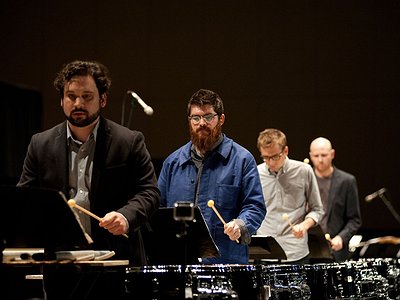Part 2
Time is a variable only seldomly discussed within the context of contemporary composition. Can you tell me a bit about your perspective on time in relation to a composition and what role it plays in your work?
Pieces have to last the right amount of time. How you figure that out, I don’t really know. Time is, of course, the medium through which musical form and structure are expressed. But I don’t think we talk about it on its own much because composers tend to make decisions about time by feel. Too long, too short, just right. I do think that, in certain pieces, time can change its function – it isn’t just a measure of minutes elapsed but a tool for informing the way you listen. All those great, late pieces from Morton Feldman, for example, may dedicate an entire hour just to changing your heart rate or your metabolism, so that you can better hear the detail in the last half hour. The taking up of time in such pieces is, in fact, the structure.
What do improvisation and composition mean to you and what, to you, are their respective merits?
Improvisation, when it works, is meant to ennoble a moment that we share together – we are, together, hearing something being invented right before us. It can be very exciting to be a part of that. But because so much of what I do is about trying to take attention off ‘the moment’ and put it on the totality of the event it doesn’t have a very large role in my work.
Do you feel it important that an audience is able to deduct the processes and ideas behind a work purely on the basis of the music? If so, how do you make them transparent?
My music is highly structured, made with patterns and math and note counting and sometimes months of pre-compositional planning. But when the music is playing in front of an audience I don’t want them to concentrate on any of that. The patterning and planning all exist so that I can build an experience I want to have, and that I want to share. It is the experience that is worth sharing, I hope, and not the planning behind it.
With more and more musicians creating than ever and more and more of these creations being released, what does this mean for you as an artist in terms of originality? What are some of the areas where you currently see the greatest potential for originality and who are some of the artists and communities that you find inspiring in this regard?
I am excited that there are so many musicians making music right now. And, as you might guess from my answer about originality above, music doesn’t need to be original to be good. We need more good music and I have a feeling that if more people in the world are making music then we may end up with more good music.
How would you define the term “interpretation”? How important is it for you to closely work together with the artists performing your work?
My pieces are often problems I have invented that a player has to solve, so inviting interpretation is a big part of my music making. I will sometimes leave an entire parameter of a composition open – a completely notated piece written for instruments that the performer must choose for himself or herself, a completely notated piece written without any emotional or dynamic instructions at all. I like the idea that every player has a skill or a talent or a unique ability and if I pose the right problem he or she will feel that their skill or talent or ability is the exact tool that my piece needs.
The effect of a piece doesn't merely depend on the performance of the musicians, but also on the place it is performed at. How do you see the relationship between location and sound? In how far do you feel the current system of concert halls is still the right one for your music – or for contemporary music in general?
This question points at something that I think is larger than just location. In a way, writing a piece of music is a utopian act. It is saying that the world could be made better if it just had this previously unimagined sound in it. If it is really meaningful for us to call this new thing into the world then maybe there is a new way it should be played, or a new way it should be presented, or a new place, or a new kind of listener. Having worked so hard to create this new music I believe it is also the composer’s responsibility to make sure that it is placed in the right context for its new-ness to be appreciated. We have all these institutions that already exist, like concert halls and presenters and orchestras and venues, and they may not be right place for showing a new piece to its best advantage. They may be. I honestly believe that if a composer can envision something that needs to be changed in order for a piece or an idea to shine then it is his or her responsibility to try to change it.
What's your view on the role and function of music as well as the (e.g. political/social/creative) tasks of composers today - and how do you try to meet these goals in your work?
I think we have a duty to be good citizens, to do good in the world, to help other people, to comfort the sick, to call out evil wherever we see it. These are our responsibilities to each other, as people. Music may or may not have anything to do with them.
Do you have a musical vision that you haven't been able to realise for technical or financial reasons – or an idea of what music itself could be beyond its current form?
I would like to write a piece of music that everyone in the world could perform together, and then get everyone to perform it.
David Lang's website is http://davidlangmusic.com/






